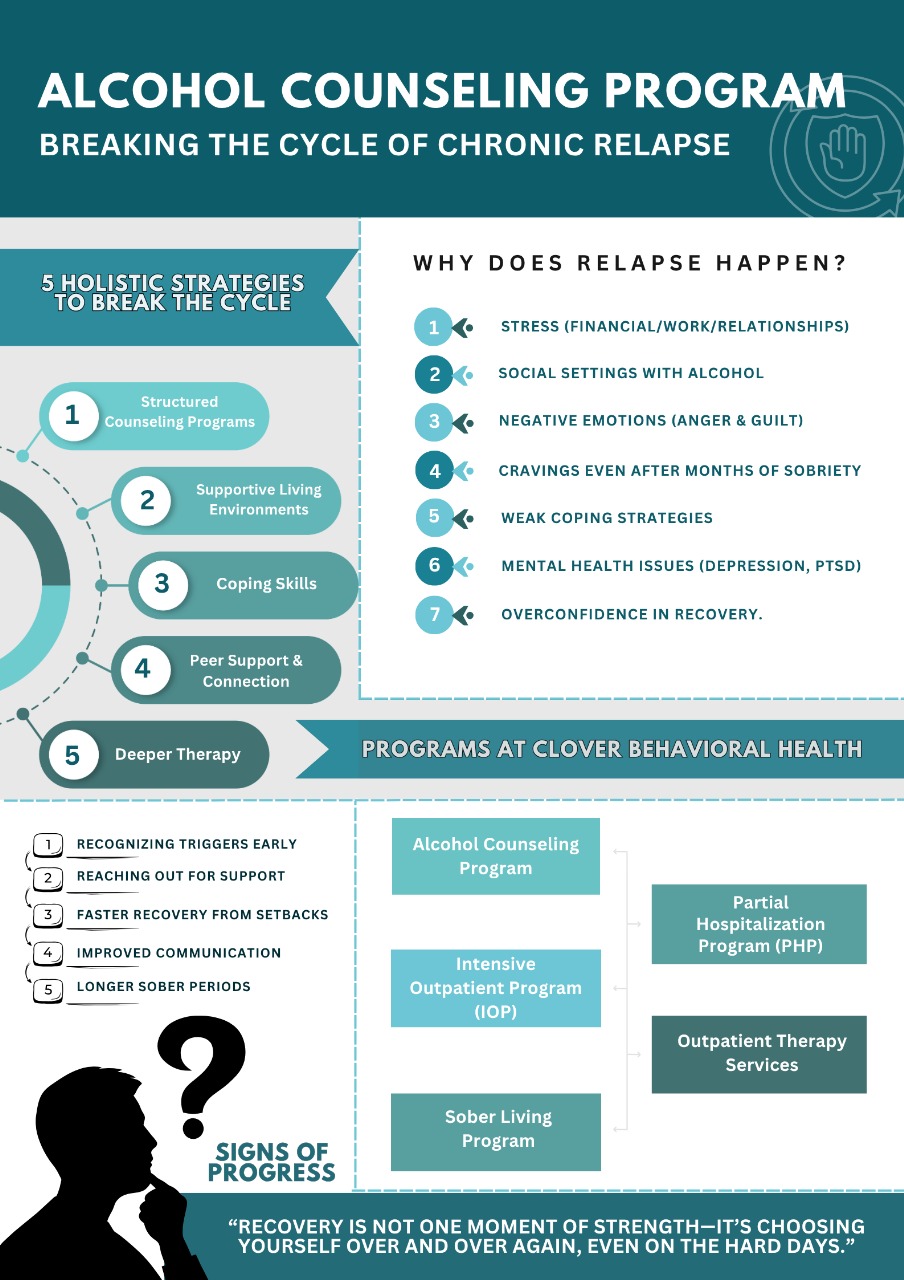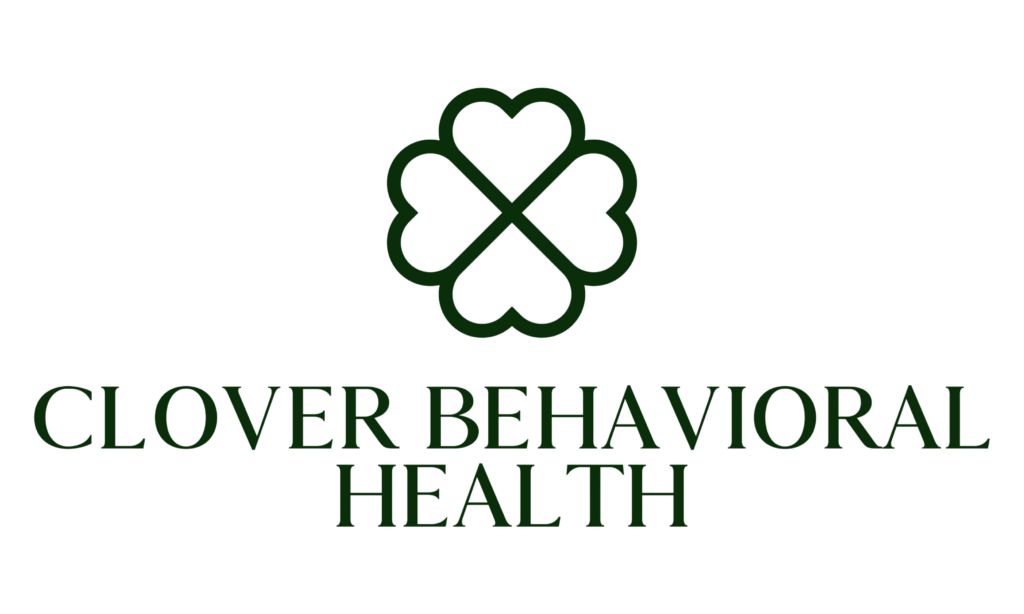Struggling with both alcohol addiction and a mental health disorder isn’t rare—it’s real, and it’s treatable. When two battles collide, recovery requires a deeper, more focused approach. This is where dual diagnosis comes into play.
The Substance Abuse and Mental Health Services Administration (SAMHSA) noted that almost 9.2 million adults in the U.S. have co-occurring disorders, a large number of those are not aware of the fact that they require integrated care. In this article, we’ll break down the signs, causes, and most effective treatments for alcohol addiction and mental health issues.
If you or a loved one is facing both mental health challenges and alcohol addiction, this guide will help you understand the path to recovery—and how Clover Behavioral Health in Andover, MA, can support you every step of the way.
What Is a Dual Diagnosis and Why Does It Matter in Alcohol Counseling?
Dual diagnosis means a person has both a substance use disorder and a mental illness. In alcohol counseling, this is very important because both conditions affect one another. For example, someone with anxiety might use alcohol to cope, which can make the anxiety worse over time.
At Clover Behavioral Health, dual diagnosis is treated with a special integrated treatment approach. This means mental and substance-related issues are addressed at the same time. This leads to better long-term recovery.
How Common Are Co-Occurring Disorders Among Alcohol-Dependent Individuals?
It is estimated that there are more than 19.4 million adults in the U.S who develop co-occurring disorders every year. Additionally, about 50 percent of individuals who are addicted to alcohol possess one or more mental health problems.
That’s why centers like Clover Behavioral Health provide customized care for both issues. Early diagnosis and the right therapy improve outcomes.
Condition | Percentage Affected by Alcohol Use Disorder |
Depression | 40% |
Anxiety Disorders | 25% |
PTSD | 20% |
Signs and Symptoms of Dual Diagnosis Disorders
Recognizing dual diagnosis symptoms early can prevent worsening mental and physical health.
Common symptoms include:
- Sudden mood changes
- Poor focus and memory
- Withdrawing from family and friends
- Increased alcohol use to cope
- Trouble at work or school
If you see these signs, seek help from a dual diagnosis treatment center like Clover Behavioral Health.

What Causes Dual Diagnosis in Alcohol Users in Andover, MA?
There is not one cause. Many dual diagnosis causes come from brain chemistry, genetics, trauma, or long-term stress. Alcohol may be used to self-medicate mental health conditions, creating a cycle.
Some people may already have a mental illness like depression. Alcohol only worsens the symptoms and delays proper treatment.
Mental Health Disorders That Often Co-Exist with Alcohol Addiction
Here are common psychiatric conditions seen with alcohol addiction:
- Depression
- Anxiety Disorders
- Post-Traumatic Stress Disorder (PTSD)
- Bipolar Disorder
These require dual-focused care like cognitive behavioral therapy (CBT) and dialectical behavioral therapy (DBT)—both offered at Clover Behavioral Health.
How Alcohol Use Can Trigger or Worsen Mental Health Issues
Can mental illness lead to addiction? Yes, but it also works the other way. Alcohol can change brain function, leading to mental illness and substance abuse issues.
Long-term drinking may cause:
- Anxiety
- Depression
- Sleep disorders
- Emotional outbursts
These are all linked with drug and alcohol withdrawal symptoms and untreated trauma.
How Is Dual Diagnosis Diagnosed in Andover, MA?
How is dual diagnosis diagnosed? At Clover Behavioral Health, professionals use evidence-based tools like:
- Mental health screening forms
- Alcohol use assessments
- Medical evaluations
Accurate diagnosis is the first step toward dual diagnosis recovery. It allows for a personalized care plan.
Integrated Treatment: Alcohol Counseling + Mental Health Care
The best therapy for dual diagnosis is an integrated treatment approach. That means treating both conditions together instead of separately.
At Clover Behavioral Health, treatment includes:
- CBT and DBT therapy
- Medication management
- Group counseling
- Relapse prevention strategies
- Therapy for co-occurring disorders
Levels of Care for Dual Diagnosis Patients in Andover, MA
Clover Behavioral Health provides many dual diagnosis treatment options:
|
Level of Care |
Description |
|
Detoxification |
Helps manage withdrawal safely |
|
In-patient dual diagnosis care |
24/7 support for severe cases |
|
Partial Hospitalization (PHP) |
Day program for structured care |
|
Intensive Outpatient Program (IOP) |
Flexible, therapy-focused program |
|
Outpatient Services |
Weekly sessions for stable patients |
This range ensures every patient gets the care they need.
Long-Term Recovery: Aftercare and Support for Dual Diagnosis
Dual diagnosis outlook improves with aftercare. Clover Behavioral Health offers:
- Support groups for addiction recovery
- Ongoing therapy
- Medication check-ins
- Job and housing support
- Emotional and social support in recovery
These relapse prevention strategies are vital for staying sober and mentally strong.
➡️ Read our latest blog: Alcohol Counseling Program in Bedford, MA: Family Therapy for Alcohol Abuse Recovery – Discover how family involvement can strengthen addiction recovery and support lasting change.
Reach Out to Clover Behavioral Health Today for Dual Diagnosis Support
Dealing with depression and addiction can be an overwhelming task, but you are not alone. Compassionate professionals at Clover Behavioral Health in Andover, MA, provide personalized treatment to a person with co-occurring disorders.
Our programs combine modern therapies like CBT, DBT, and detoxification, all in a supportive setting built for healing. Whether it’s outpatient, IOP, or inpatient dual diagnosis care, we tailor each plan to your unique needs. Dual diagnosis recovery is possible with the right help.
Take the first step toward a brighter future—call Clover Behavioral Health today and begin your journey toward lasting wellness.
FAQs
Q: What is the most effective treatment for dual diagnosis?
The most effective treatment is an integrated treatment approach, which addresses both mental health and addiction at the same time. This often includes CBT, DBT, medication management, and support groups for addiction recovery.
Q: What is the new name for dual diagnosis?
The modern term for dual diagnosis is co-occurring disorders, which reflects the presence of both a mental illness and a substance use disorder in the same person.
Q: What is the best way to treat co-occurring disorders?
The best approach is a comprehensive care plan that blends therapy for co-occurring disorders, medical treatment, and relapse prevention strategies—all offered in specialized dual diagnosis treatment centers.
Q: What are the barriers to dual diagnosis treatment?
Barriers to dual diagnosis treatment include stigma, misdiagnosis, lack of integrated care, and limited access to specialized programs. These challenges often delay recovery for individuals with co-occurring disorders.














